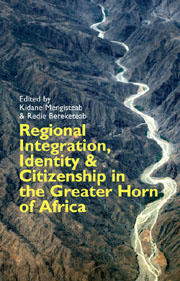Book contents
- Frontmatter
- Contents
- List of Tables, Figures & Appendices
- Notes on Contributors
- Acknowledgements
- List of Acronyms
- Part One RELEVANCE OF INTEGRATION TO IDENTITY AND CITIZENSHIP
- Part Two CRITICAL FACTORS IN INTEGRATION
- Part Three LESSONS FROM SELECTED AFRICAN INTEGRATION SCHEMES
- 8 Inter-Governmental Authority on Development (IGAD): A Critical Analysis
- 9 The East African Community: Can it be a Model for Africa's Integration Process?
- 10 The Economic Community of West African States (ECOWAS) and the Quest for Community Citizenship: Any Lessons for the Greater Horn Region?
- Index
- EASTERN AFRICAN STUDIES
10 - The Economic Community of West African States (ECOWAS) and the Quest for Community Citizenship: Any Lessons for the Greater Horn Region?
from Part Three - LESSONS FROM SELECTED AFRICAN INTEGRATION SCHEMES
Published online by Cambridge University Press: 05 February 2013
- Frontmatter
- Contents
- List of Tables, Figures & Appendices
- Notes on Contributors
- Acknowledgements
- List of Acronyms
- Part One RELEVANCE OF INTEGRATION TO IDENTITY AND CITIZENSHIP
- Part Two CRITICAL FACTORS IN INTEGRATION
- Part Three LESSONS FROM SELECTED AFRICAN INTEGRATION SCHEMES
- 8 Inter-Governmental Authority on Development (IGAD): A Critical Analysis
- 9 The East African Community: Can it be a Model for Africa's Integration Process?
- 10 The Economic Community of West African States (ECOWAS) and the Quest for Community Citizenship: Any Lessons for the Greater Horn Region?
- Index
- EASTERN AFRICAN STUDIES
Summary
INTRODUCTION
This chapter explores the efforts so far made by the Economic Community of West African States (ECOWAS) towards institutionalizing community citizenship encompassing nationals of its member states in the West African sub-region, and the lessons that can be learned from this by Regional Economic Communities (RECs) in the Greater Horn of Africa region (GHR). There is compelling evidence that ECOWAS as a regional organization has achieved considerable progress in promoting a concept of regional or supra-national identity or citizenship for the people of its member states through various protocols, agreements, and policies designed to promote West African integration, security and development. This can be gleaned from the goals of the revised ECOWAS treaty of 1993, and the recognition that one of the greatest challenges confronting the organization is that of its transformation from an ‘ECOWAS of states to an ECOWAS of people’ (ECOWAS, 2009).
What makes the ECOWAS case particularly instructive is the reality that while most of its member states are immersed in varying levels of the crisis of nation-statism, based largely on the unresolved struggles over citizenship rights, the regional organization has made some modest progress in terms of a notion of ECOWAS citizenship. Although several commentators have referred to West Africa as a belt of conflict in the 1990s due to the conflicts that ravaged the Mano River countries – Liberia, Sierra Leone, and then Guinea-Bissau, Côte d'Ivoire – and the episodic outbursts of sectarian and ethnic-related violence in central Nigeria and the Niger Delta, it can be argued that in most cases these conflicts were partly related to the crisis of citizenship and national identity in these countries.
- Type
- Chapter
- Information
- Publisher: Boydell & BrewerPrint publication year: 2012



